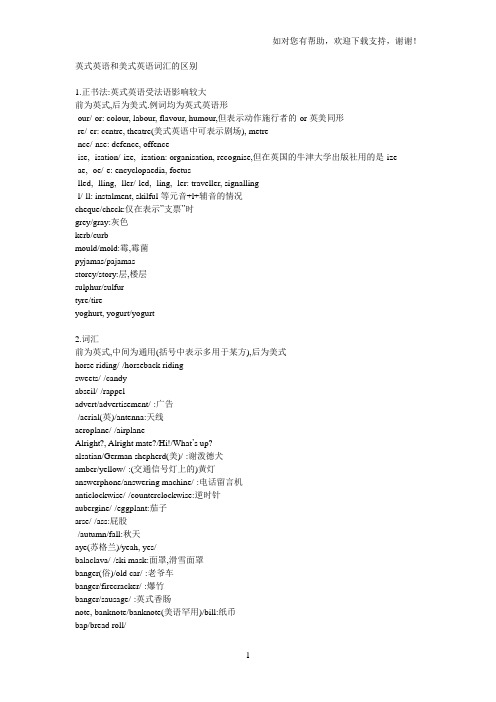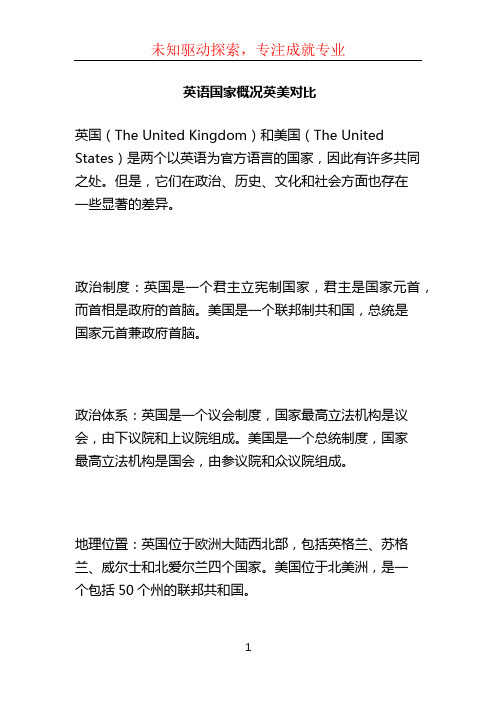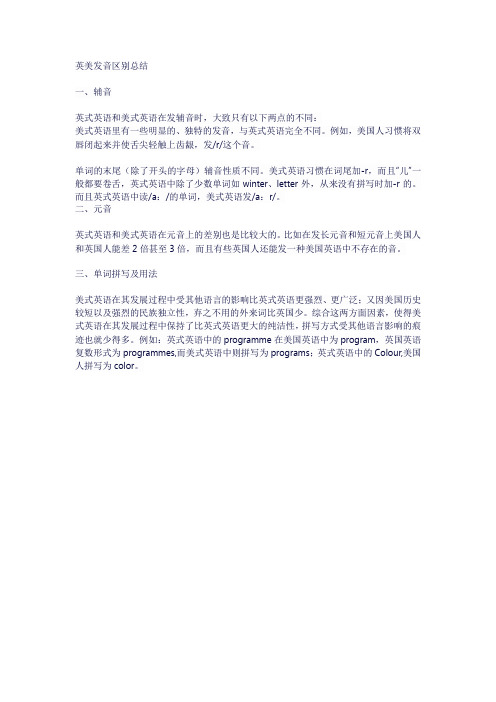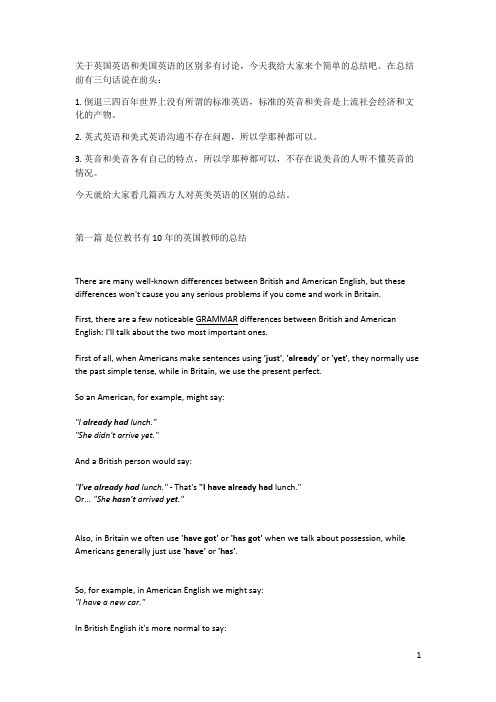英美区别
美式英语与英式英语之间的差异

英国英语就是英国人说的英语,而南部英国人所说的话则是英国的标准英语。
美国英语就是美国人说的英语。
为什么英国英语和美国英语有差别?这里有历史的原因。
美国是一个移民国家,最早的移民就是17世纪来自英国而在美国东部定居的英国移民,到18世纪后期,英国移民已有四百多万。
他们说的英语大致上还是英国英语。
但随后的两个世纪以来,陆续有大批的移民来自爱尔兰、德国、法国、斯堪纳维亚国家、东欧和南欧的一些国家。
此外还有从墨西哥来的西班牙人,和亚洲来的中国人和日本人。
所有这些人都须学英语才能生活下去,而这些人原来所说的本国语又都对英语带来影响。
但是总的来说,美国英语主要是17世纪英国英语在美国的进一步发展。
美国英语继承了英国英语的语法结构和基本词汇,但是在词汇方面也吸收了一些外来成分。
这些外来成分来自美洲印第安人的语言和许多移民国家的语言。
British English is the British say English, and south British said is Britain's standard English. American English is the American people say English.Why British English and American English has difference? Here are the historical reason. The United States is a nation of immigrants, and of the first settlers came from England and is 17 th century in the eastern United States settled English settlers, to the late eighteenth century, Britain more than four hundred immigrants. They say English in general or British English. But the next two centuries, has a large number of immigrants from Ireland, Germany, France, Campbell, Scandinavia, eastern and southern Europe countries of some countries. In addition to the Spanish people from Mexico, and Asia to the Chinese and Japanese. All of these people must learn English can live, but these people originally said to English native language and impact. But in general, the American English major is 17 th century British English in the further development of the United States. American English inherited British English grammar structure and basic vocabulary, but also in vocabulary absorbed some foreign elements. These foreign component from American indians language and many immigrants the language of the country.美国英语和英国英语之间的区别有以下几个方面:American English and British English is the difference between the following aspects:1.In the words:gas/gasoline (美) —— petrol(英); baggage (美)——luggage(英); package (美)——parcel(英); mail(美)——post(英);美国英语所特有的词汇和短语可分为三类:第一类是美国人创造的新词,如movie(电影)、bootlegger(贩私酒人)、O.K.(全对)、flatfooted(直截了当的)等;The peculiar to the English words and phrases can be divided into three groups: the first kind is the American people to create new words, such as movie (film), bootlegger (bootlegging wine), O.K. (in the), flatfooted (direct);第二类是有些词虽然在英国英语中仍旧使用,但美国人给予新的涵义,如homely 这词,英国英语意为“家庭的”,但美国英语则有“不漂亮”的意思;The second type is some words while in British English still use, but the Americanpeople to give new meaning, such as homely this word, British English meaning"family", but the United States is English "not beautiful" mean;又如bug这词英国英语“臭虫”,美国英语则“昆虫”;And as a bug the word "bugs" British English and American English is "insects";再如mad这词英国英语意为“疯狂的”,但美国英语则为“生气的”与angry 意思相同;Be like again mad this word British English meaning "crazy", but the American English is "angry" means the same with angry;第三类为有些词在英国已失去原来的某种意义,但在美国还保留下来,如fall这词,美国英语中有“秋季”的意思,但在英国早已没有这个意义;The third class for some of the words in Britain has lost the original some kind of meaning, but the United States also remained, and fall like the word, the American English is "autumn" mean, but in Britain had no the meaning;再如sick这词,美国意为“有病的”,而在英国用ill而不用sick。
英式英语与美式英语词汇的区别

英式英语和美式英语词汇的区别1.正书法:英式英语受法语影响较大前为英式,后为美式.例词均为英式英语形-our/-or: colour, labour, flavour, humour,但表示动作施行者的-or英美同形-re/-er: centre, theatre(美式英语中可表示剧场), metre-nce/-nse: defence, offence-ise, -isation/-ize, -ization: organisation, recognise,但在英国的牛津大学出版社用的是-ize -ae, -oe/-e: encyclopaedia, foetus-lled, -lling, -ller/-led, -ling, -ler: traveller, signalling-l/-ll: instalment, skilful等元音+l+辅音的情况cheque/check:仅在表示”支票”时grey/gray:灰色kerb/curbmould/mold:霉,霉菌pyjamas/pajamasstorey/story:层,楼层sulphur/sulfurtyre/tireyoghurt, yogurt/yogurt2.词汇前为英式,中间为通用(括号中表示多用于某方),后为美式horse riding/-/horseback ridingsweets/-/candyabseil/-/rappeladvert/advertisement/-:广告-/aerial(英)/antenna:天线aeroplane/-/airplaneAlright?, Alright mate?/Hi!/What’s up?alsatian/German shepherd(美)/-:谢泼德犬amber/yellow/-:(交通信号灯上的)黄灯answerphone/answering machine/-:电话留言机anticlockwise/-/counterclockwise:逆时针aubergine/-/eggplant:茄子arse/-/ass:屁股-/autumn/fall:秋天aye(苏格兰)/yeah, yes/-balaclava/-/ski mask:面罩,滑雪面罩banger(俗)/old car/-:老爷车banger/firecracker/-:爆竹banger/sausage/-:英式香肠note, banknote/banknote(美语罕用)/bill:纸币bap/bread roll/-bap(俗)/breasts/--/barbecue/grill:烤肉,露天烤肉bath/bathtub/-:浴缸bedsit/-/single room occupancy:单人房biro/ball point pen/-:圆珠笔bloke/guy/-boiler/-/furnace:供暖锅炉bonnet/-/hood:汽车前盖boot/-/trunkbraces/-/suspenders:(吊带裤的)吊带building society/-/savings and loan associationbum bag/-/fanny pack:腰包bus station, coach station/-/bus terminal:公交总站burgle/-/burglarize:入室盗窃campsite/-/campground:宿营地,露营场camping pitch/-/campsite:支帐篷的地方candy floss/-/cotton candy:棉花糖caravan/-/travel trailer:拖挂式房车railway carriage, carriage, coach/-/railroad car, car:客车(车厢)casualty, accident and emergency, A&E/emergency department/emergency room catapult/-/slingshot:(小型)弹弓car park/-/parking lot, parking garagecashpoint, cash machine, hole-in-the-wall/ATM:自动取(存)款机central reservation/-/median strip:中央隔离带canteen/-/cafeterialcinema/-/movie theater, theater:电影院cheers/thanks/-:(语气较轻的)谢谢chemist/pharmacy/drugstore:药店chips/french fries, fries/-:炸薯条,炸土豆条cling film/-/plastic wrap:食品保鲜膜,食品包装膜coach/-/bus:城际观光巴士cooker/-/stove, range:(烹调用的)灶coriander, coriander leaves/-/cilantro:香菜corn/grain/-:谷物,粮食cornflour/-/cornstarch:玉米粉,玉米淀粉corner shop/-/general store:小卖部,小杂货店cot/-/crib(cot表示简易折叠床):婴儿床cotton bud/-/cotton swab:棉签,棉棒courgette/-/zucchini:西葫芦crisps/-/potato chips:薯片,土豆片cul-de-sac/dead end/-:盲路,死胡同CV(curriculum vitae)/-/résumé:简历,履历drawing pin/-/thumbtack:图钉driving licence/-/driver’s license:驾驶证,驾驶执照(注意拼写)dressing gown/-/bathrobedual carriageway/-/divided highway:(有中央隔离带的)干线道路dummy/-/pacifier:(婴儿含的)奶嘴duvet, quilt, bedspread/-/comforter:床罩,被罩dustbin, bin/-/wastebasket, trash can:垃圾箱electric fire/electric heater/space heaterengaged/busy/-:(对方)通话中,正在通话entrée, starter/first course, appetizer/-:前菜-/main course/entrée:主菜council estate, estate/housing project:住宅区,住宅小区industrial estate, estate/industrial park:工业区,工业开发区estate agent/-/realtor:不动产商estate car/-/station wagonex-directory/-/unlisted number:未记入电话号码簿的号码fag(俗)/-/Nicotiana tabacum:烟草fizzy drink/carbonated soft drink/sodaflannel/facecloth/washclothflat/-/apartmentflyover/-/overpass:立交桥,立体交叉点fringe/-/bangsfortnight(14+night)/two weeks/-:两周,两个星期football/-/soccer:足球frying pan(skillet为方言)/frying pan/skillet:平底锅full stop/-/period:句点,终止符garage, petrol station/-/gas station:加油站gobsmacked(俗)/astonished/-goods/freight, cargo/-:货物grass(俗), supergrass(俗)/informant/stool pigeon(俗):密告者grill/-/broil(grill指的是露天烤肉)grotty(俗)/dirty/-greengrocer/-/-:蔬菜店guard/conductor/-:列车长hard shoulder/-/breakdown lane:(硬)路肩hash, hash mark, hash sign/number sign/pound sign:井号,# Have you got…?/Do you have…?(美)/-headmaster, headmistress/-/principal:校长high street/main street/-:商业街hire purchase, instalment plan/-/installment plan:割赋贩卖hob/-/cooktop, range:灶(的上表面)holiday/holiday(指节日)/vacation:休假,假期旅行How no?(苏格兰)/Why not?/-Hoover(商标)/vacuum cleaner/-:吸尘器indicator/-/blinker, turn signal:转向灯,方向指示灯inverted commas/quotation marks/-:引号-/police car/patrol car:警车jelly/-/jell-O(商标), gelatin dessert:果冻jam/-/jelly:(果冻状的)果酱jumble sale/-/rummage sale:(学校,教会等街区性的)拍卖jumper, pullover/sweater(美)/-:毛衣lass(苏格兰), bird(俗)/girl/chick(俗)laundrette/-/laundromat:(投币式)洗衣店letter box, postbox/-/mailbox:(收信用的)邮箱,信箱lift/-/elevator:(箱式)电梯loch(苏格兰)/lake/-:湖,峡湾loo, bogs(俗), khazi(俗)/toilet/restroom:卫生间,厕所lorry/truck/-:卡车lounge, sitting room/living room/-:起居室mackintosh, mac/raincoat/-:雨衣,雨披mains, mains electricity/-/household power, domestic power, line power, grid power:商用电源mate/-/pal, buddy, budmaths/mathematics/math:数学managing director, MD/chief executive officer, CEO/-:行政总裁,最高管理者Happy Christmas!/Merry Christmas!/-mince, minced meat/-/ground meat:肉酱,肉沫mobile phone/-/cell phone:手机,移动电话motorway/-/freeway, expressway:高速公路motor car/car/automobile:汽车nappy/-/diaper:尿布,尿片newsagent/-/newsdealer:报刊亭,杂货店news reader/-/news anchor, newscaster:新闻播报员,播音员nick(俗)/-/-:警察局;逮捕;盗窃notice board/-/bulletin board:公告栏,布告栏number plate/registration plate/license plate:车牌OAP(old age pensioner)/elderly/senior citizen:高龄者,老人off-licence/-/liquor store:贩酒店Oi!/Hey!/-:(打招呼的)喂!pavement/-/sidewalk:人行道pedestrian crossing, zebra crossing, pelican crossing/-/crosswalk:人行横道,斑马线peg, clothes peg/-/clothes-pin:晾衣夹petrol/-/gas, gasoline:汽油postbox, pillar box/-/mailbox:(寄信时的)邮筒-/pissed(俗)/loaded(俗), wasted(俗):醉了,喝醉了-/pissed off(俗)/pissed(俗)pisshead(俗)/-/takeout:酒豪,千杯不倒的人pissing it down(俗)/pissing down(俗)/-:大雨,下大雨plaster/-/Band-aid(商标):创可帖plaster/orthopedic cast, cast/-:(石膏)绷带P&P(posting and packing)/-/S&H(shipping and handling):(物品的)邮资,邮费to post/to send/to mail:邮寄,投递postcode/-/postalcode(常用), zipcode:邮政编码poste restante/-/general delivery(poste restante仅用于国际邮件):(邮件的)滞留power cut/-/power outage:停电pram/-/baby buggy:(厢型)婴儿车press-up/push-up/-:俯卧撑provisional licence/-/learner’s permit:临时驾驶执照,练习驾驶执照pudding/dessert/-:(餐后)甜点purse/coin purse/-:(女性用的)零钱钱包,小钱包-/handbag/purse:手袋,手包pushchair, buggy/-/stroller:(椅型)婴儿车pylon/-/transmission tower, mast:输电铁塔queue/-/line:(等待的)队,队列quite/fairly/pretty:相当,很quid(俗)/-/-:(英)镑railway/-/railroad:铁路,铁道rat-arsed(俗)/-/-:烂醉redundancy/layoff/-:解雇rev counter/-/tachometerreverse charge call/-/collect call:对方付费电话the River (Thames)/-/the (Colorado) Riverroundabout/-/rotary, traffic circle:环岛(式交叉点)roundabout/merry-go-round, carousel/-:旋转木马rozzer, copper, filth, pigs(俗)/cop/-:警官rubber/eraser(美)/-:橡皮(擦)rubbish/-/garbage, trashsanitary towel/-/sanitary napkin:卫生巾Sellotape(商标)/cellophane tape/scotch tape:透明胶带serviette/table napkin/-:餐巾set square/-/triangle:三角尺,三角板silencer/-/mufflershop/-/store(shop指小型商店):商店shop assistant/shop worker/salesclerkshopping trolley/-/shopping cartskint(俗)/broke(俗)/-sleet/-/-:霙,介于雨夹雪和冻雨之间的一种天气现象-/-/sleet:冻雨spanner/-/wrench:扳手spring onion/-/scallion:大葱squaddie(俗)/-/G.I.(俗):士兵squash/cordial/-:(加水稀释后饮用的)果汁饮料sultana/-/raisin:葡萄干summat(俗)/something/-swede/-/rutabaga:芜菁takeaway/-/to go:(将刚购买的食品带走的)外卖tannoy(商标)/PA system, loudspeaker/-:扩音装置,PAtap/-/faucet:水龙头tea/dinner, supper/-:晚餐tea(一部分地区), dinner/-/lunch:一天里最为充实的一顿饭(也可能是午餐) tea towel/dish towel/-telephone box/telephone booth(美)/-telly, box/TV/-:电视机ticket tout/-/scalper:黄牛,以倒卖票给他人为生的人tinned food/canned food(美)/-:罐头(食品)tinnie/-/-:罐装啤酒tomato sauce/ketchup/catsup(一部分地区):番茄酱torch/-/flashlight:手电筒tout/-/solicitor:拉客的人,招揽客人的人tower block/high-rise apartment(美)/-:高层公寓trainers/-/sneakers, runners:休闲运动鞋tram/-/streetcar:有轨电车trousers/-/pants:裤子tube, underground/-/subway:地铁uni/university/college:大学us(俗)/me/-:第一人称单数waistcoat/-/vest:(西服的)背心,马甲washing-up liquid/detergent(美)/dish soap:餐具洗洁精,洗碗精wanker(俗)/-/jerk(俗)wee(苏格兰)/small, little, wee/-well(俗)/very/wicked(方言)wellington boots, wellies/rubber boots/-:长靴windscreen/-/windshield:(汽车的)挡风玻璃wing mirror/-/side mirror:(汽车两侧的)后视镜Y-fronts(俗)/briefs/tighty whities(俗):三角裤zed/-/zee:(字母)Zground floor/-/first floor:一楼,一层first floor/-/second floor:二楼,二层。
英美英语区别

(二)在美音中/t/发音与/d/相近 注意:美音中/t/ 出现在两个元音之间且处于非重读位 置的时候,发音近似/d/, 而不是完全等同。我们这里 用/d/来表示这个近似音。
美音 英音 city /sidi/ /siti/ better /bedEr/ /betE/ pretty /pridi/ /priti/
After-class assignment: recording
Choose whatever you like and record it as an evidence to show that you will have made some progress in the near future. If possible, try to pronounce it with American or British accent. Bring it to the class next time and share with your classmates.
• 拼写差异, 同词异义, 同义异词
• (七)组合-ary和-ory结尾
Try it now
• 对比英美音(新概念第三册Lesson 1): Try to read it: A Puma at large Pumas are large, cat like animals which are found in America. When reports came into London Zoo that a wild puma had been spotted forty five miles south of London, they were not taken seriously. However, as the evidence began to accumulate, experts from the Zoo felt obliged to investigate, for the descriptions given by people who claimed to have seen the puma were extraordinarily similar. 英音 美音
英语国家概况英美对比

英语国家概况英美对比英国(The United Kingdom)和美国(The United States)是两个以英语为官方语言的国家,因此有许多共同之处。
但是,它们在政治、历史、文化和社会方面也存在一些显著的差异。
政治制度:英国是一个君主立宪制国家,君主是国家元首,而首相是政府的首脑。
美国是一个联邦制共和国,总统是国家元首兼政府首脑。
政治体系:英国是一个议会制度,国家最高立法机构是议会,由下议院和上议院组成。
美国是一个总统制度,国家最高立法机构是国会,由参议院和众议院组成。
地理位置:英国位于欧洲大陆西北部,包括英格兰、苏格兰、威尔士和北爱尔兰四个国家。
美国位于北美洲,是一个包括50个州的联邦共和国。
历史:英国是一个历史悠久的国家,曾经是大英帝国的中心。
美国是一个相对较年轻的国家,于18世纪末脱离了英国的统治,并在19世纪发展成为一个强大的国家。
文化:英国是文化的发源地之一,拥有众多的文学、戏剧和音乐作品。
美国文化则是一个融合了来自世界各地的移民文化的独特混合体,具有多样性和包容性。
语言:英国英语和美国英语有一些差异,包括发音、词汇和拼写等方面。
英国英语通常被认为更加保守和正式,而美国英语则更加开放和非正式。
经济:英国是世界上最大的金融中心之一,拥有发达的服务业和制造业。
美国是世界上最大的经济体,具有多样化和创新的经济结构。
教育:英国拥有世界上一些最古老和著名的大学,如牛津大学和剑桥大学。
美国也拥有一些世界上顶尖的大学和研究机构,如哈佛大学和斯坦福大学。
总体而言,英国和美国都是世界上具有重要影响力的国家,它们在许多方面都有独特之处,同时也有一些共同的价值观和文化传统。
英美音区别小结

英美音区别小结英音发音靠前,字正腔圆,比较清脆生硬;而美音发音比较靠后,更鼻音化一些,听起来比较圆润。
一、卷舌音英音中r要发卷舌音,如early, spare , worse, before, prefer等比较好掌握。
不过,许多人把卷舌音当成了美音的招牌发音,无论读什么单词都要卷一下舌头,比如把China读成Chinar, idea读成idear, really 读成rearlly, famous 读成famours, 结果闹出来很多笑话。
所以大家一定要牢记,单词中“有r才能卷,没r不能卷”。
就像because, idea, cause ,doll ,poll, college, modern等都是不能卷舌的。
二、长元音[α:]异化为[æ]字母a 出现在-ass,-st , -th, -ff, -nce等组合前面,英音中[α:],美音中读[æ]。
如:can’t, chance, advantage, staff, answer, pass, advance, after, ask, banana, branch, castle, commander, example, fast, France, glance, glass, half, last等。
三、元音[ɔ:]和[ɔ]异化为介于[ɔ]和[α]之间的音发音时可以试着先念一个[ɔ],然后将嘴上下拉到与[α]等长,但注意把嘴的宽度控制在与[ɔ]一致。
如:water,popular, caught, bottle, rock, God, dog, hot, odd, dollar, watch, frog, monster, cross, stop, not等。
四、在字母d, t, s, st, n后面,半元音[j]弱化,将[ju:]念成[u]如:student,new, nuclear, due, Tuesday, tune, duty, suit等。
英美发音区别总结

英美发音区别总结
一、辅音
英式英语和美式英语在发辅音时,大致只有以下两点的不同:
美式英语里有一些明显的、独特的发音,与英式英语完全不同。
例如,美国人习惯将双唇闭起来并使舌尖轻触上齿龈,发/r/这个音。
单词的末尾(除了开头的字母)辅音性质不同。
美式英语习惯在词尾加-r,而且“儿”一般都要卷舌,英式英语中除了少数单词如winter、letter外,从来没有拼写时加-r的。
而且英式英语中读/a:/的单词,美式英语发/a:r/。
二、元音
英式英语和美式英语在元音上的差别也是比较大的。
比如在发长元音和短元音上美国人和英国人能差2倍甚至3倍,而且有些英国人还能发一种美国英语中不存在的音。
三、单词拼写及用法
美式英语在其发展过程中受其他语言的影响比英式英语更强烈、更广泛;又因美国历史较短以及强烈的民族独立性,弃之不用的外来词比英国少。
综合这两方面因素,使得美式英语在其发展过程中保持了比英式英语更大的纯洁性,拼写方式受其他语言影响的痕迹也就少得多。
例如:英式英语中的programme在美国英语中为program,英国英语复数形式为programmes,而美式英语中则拼写为programs;英式英语中的Colour,美国人拼写为color。
英国英语和美国英语区别大总结

关于英国英语和美国英语的区别多有讨论,今天我给大家来个简单的总结吧。
在总结前有三句话说在前头:1. 倒退三四百年世界上没有所谓的标准英语,标准的英音和美音是上流社会经济和文化的产物。
2. 英式英语和美式英语沟通不存在问题,所以学那种都可以。
3. 英音和美音各有自己的特点,所以学那种都可以,不存在说美音的人听不懂英音的情况。
今天就给大家看几篇西方人对英美英语的区别的总结。
第一篇是位教书有10年的英国教师的总结There are many well-known differences between British and American English, but these differences won't cause you any serious problems if you come and work in Britain.First, there are a few noticeable GRAMMAR differences between British and American English: I'll talk about the two most important ones.First of all, when Americans make sentences using 'just', 'already' or 'yet', they normally use the past simple tense, while in Britain, we use the present perfect.So an American, for example, might say:"I already had lunch.""She didn't arrive yet."And a British person would say:"I've already had lunch." - That's "I have already had lunch."Or... "She hasn't arrived yet."Also, in Britain we often use 'have got' or 'has got' when we talk about possession, while Americans generally just use 'have' or 'has'.So, for example, in American English we might say:"I have a new car."In British English it's more normal to say:"I've got a new car."The meaning's the same, there's just a small grammatical difference that you might notice.There are these and a few other very small differences, but to be honest, these differences almost never make it difficult for us to understand each other.On the other hand, the differences in VOCABULARY between American English and British English are stronger than the grammatical differences, but again, these very rarely cause serious problems.A lot of the words which are different are informal or slang words...For example, I think many Americans would be unfamiliar with the British slang word 'naff', which means 'un-cool' or 'poor-quality'.On the other hand, a Brit (a British person) might be very confused by a sentence like:"The café is kitty-corner to the pharmacy."This means that the café is diagonally opposite to the pharmacy, but we don't have the word'kitty-corner' in British English.Another example would be telling the time...If we want to describe 2:45 in Britain, we might say:"Quarter to three", or 3:15 would be "Quarter past three".On the other hand, in America, these might be:"Quarter of three" for 2:45, or "Quarter after three" for 3:15.It's another small difference, but it's one that's not going to cause serious problems - it's quite easy to get used to.There are also some differences in SPELLING which I should mention.One example of this is the verb 'to practise':In British English, this is spelt with an 'S', so that'sP-R-A-C-T-I-S-E.In American English, it's spelt with two 'C's, so in American English it'sP-R-A-C-T-I-C-E.And there are lots of other examples of slight difference of spelling, but about 99% of the time, British and American people can understand each other without any trouble at all. In Britain we watch lots of American films and TV programs, and we listen to lots of American music, so American English is generally very familiar to us.This is probably not quite so true for an American coming to Britain. Americans, I think, don't watch quite so much British TV or British movies.I should also point out that regional English can be an important thing to think about. Not everyone in Britain talks like James Bond. There are some regional accents in Britain which you don't hear so often in the movies, and these might be a bit more difficult to get used to.However, I'd like to finish by saying that many, many Americans live and work in Britain, and they don't have any serious language problems at all. So, Brittney, my advice to you is: don't worry about the language, you'll be fine!第二篇关于两种拼写牛津在线词典给了详细的说明British and American spellingThere are several areas in which British and American spelling are different. These are the main ones to be aware of.Words ending in –reBritish English words that end in -re often end in -er in American English:Words ending in -ourBritish English words ending in -our usually end in -or in American English:Words ending in -ize or -iseVerbs in British English that can be spelled with either -ize or -ise at the end are always spelled with -ize at the end in American English:Words ending in -yseVerbs in British English that end in -yse are always spelled -yze in American English:Words ending in a vowel plus lIn British spelling, verbs ending in a vowel plus l double the l when adding endings that begin with a vowel. In American English, the l is not doubled:Words spelled with double vowelsBritish English words that are spelled with the double vowels ae or oe are just spelled with an e in American English:Note that in American English, certain terms, such as archaeology, keep the ae spelling as standard, although the spelling with just the e (i.e. archeology) is usually acceptable as well.Nouns ending with –enceSome nouns that end with -ence in British English are spelled -ense in American English:Nouns ending with –ogueSome nouns that end with -ogue in British English end with either -og or -ogue in American English:The distinctions here are not hard and fast. The spelling analogue is acceptable but not very common in American English; catalog has become the US norm, but catalogue is not uncommon; dialogue is still preferred over dialog.Aside from spelling differences, many items and practices have different names in British and American English. To explore further, see British and American terms.第三篇这位老师给了更详细的一个说明IntroductionSpeakers of American English generally use the present perfect tense (have/has + past participle) far less than speakers of British English. In spoken American English it is very common to use the simple past tense as an alternative in situations where the present perfect would usually have been used in British English. The two situations where this is especially likely are:(i) In sentences which talk about an action in the past that has an effect in the present: American English / British English•Jenny feels ill. She ate too much.•Jenny feels ill. She's eaten too much.•I can't find my keys. Did you see them anywhere?•I can't find my keys. Have you seen them anywhere?(ii) In sentences which contain the words already, just or yet:American English / British English•A: Are they going to the show tonight?•B: No. They already saw it.•A: Are they going to the show tonight?•B: No. They've already seen it.•A: Is Samantha here?•B: No, she just left.•A: Is Samantha here?•B: No, she's just left.•A: Can I borrow your book?•B: No, I didn't read it yet.•A: Can I borrow your book?•B: No, I haven't read it yet.1. Verb agreement with collective nounsIn British English collective nouns, (i.e. nouns referring to particular groups of people or things), (e.g. staff , government, class, team) can be followed by a singular or plural verb depending on whether the group is thought of as one idea, or as many individuals, e.g.:My team is winning.The other team are all sitting down.In American English collective nouns are always followed by a singular verb, so an American would usually say:Which team is losing?whereas in British English both plural and singular forms of the verb are possible, as in:Which team is/are losing?2. Use of delexical verbs have and takeIn British English, the verb have frequently functions as what is technically referred to as a delexical verb, i.e. it is used in contexts where it has very little meaning in itself but occurs with an object noun which describes an action, e.g.:I'd like to have a bath.Have is frequently used in this way with nouns referring to common activities such as washing or resting, e.g.:She's having a little nap.I'll just have a quick shower before we go out.In American English, the verb take, rather than have, is used in these contexts, e.g.:Joe's taking a shower.I'd like to take a bath.Let's take a short vacation.Why don't you take a rest now?3. Use of auxiliaries and modalsIn British English, the auxiliary do is often used as a substitute for a verb when replying to a question, e.g.:•A: Are you coming with us?•B: I might do.In American English, do is not used in this way, e.g.:•A: Are you coming with us?•B: I might.In British English needn't is often used instead of don't need to, e.g.:They needn't come to school today.They don't need to come to school today.In American English needn't is very unusual and the usual form is don't need to, i.e.:They don't need to come to school today.In British English, shall is sometimes used as an alternative to will to talk about the future, e.g.:I shall/will be there later.In American English, shall is unusual and will is normally used.In British English shall I / we is often used to ask for advice or an opinion, e.g.:Shall we ask him to come with us?In American English should is often used instead of shall, i.e.:Should we ask him to come with us?4. Use of prepositionsIn British English, at is used with many time expressions, e.g.:at Christmas/five 'o' clockat the weekendIn American English, on is always used when talking about the weekend, not at, e.g.:Will they still be there on the weekend?She'll be coming home on weekends.In British English, at is often used when talking about universities or other institutions, e.g.: She studied chemistry at university.In American English, in is often used, e.g.:She studied French in high school.In British English, to and from are used with the adjective different, e.g.:This place is different from/to anything I've seen before.In American English from and than are used with different, e.g.:This place is different from/than anything I've seen before.In British English to is always used after the verb write, e.g.:I promised to write to her every day.In American English, to can be omitted after write, i.e.:I promised to write her every day.5. Past tense formsBelow is a table showing verbs which have different simple past and past participle forms in American and British English. Note that the irregular past forms burnt, dreamt and spoilt are possible in American English, but less common than the forms ending in -ed.Infinitive Simple past(Br) Simple past(Am)Past participle(Br)Past participle(Am)burn burned/ burned/ burned/ burned/(Br) (Am) (Br) (Am)burnt burnt burnt burnt bust bust busted bust busteddive dived dove/diveddived diveddream dreamed/dreamt dreamed/dreamtdreamed/dreamtdreamed/dreamtget got got got gottenlean leaned/leant leaned leaned/leantleanedlearn learned/learnt learned learned/learntlearnedplead pleaded pleaded/pled pleaded pleaded/pledprove proved proved proved proved/provensaw sawed sawed sawn sawn/sawedsmell smelled/smelt smelled smelled/smeltsmelledspill spilled/spilt spilled spilled/spiltspilled(Br) (Am) (Br) (Am)spoil spoiled/spoilt spoiled/spoiltspoiled/spoiltspoiled/spoiltstink stank stank/stunkstunk stunkwake woke woke/wakedwoken wokenNote that have got is possible in American English, but is used with themeaning 'have', gotten is the usual past participle of get, e.g.American English British EnglishYou've got two brothers(= you have two brothers)You've got two brothersYou've gotten taller this year You've got taller this year6. Implications for teachingThe two major varieties of EnglishThe two varieties of English most widely found in print and taught around the world are British and American - it is therefore important for teachers to be aware of the major differences between the two. And while lexical differences are the easiest ones to notice, a knowledge of grammatical and phonological differences can be useful not only for teachers to be aware of, but also to be able to deal with should they come up in class.Which is better?An important point to make is that different doesn’t mean wrong. Comments such as “American English is inferior to British English”, or “American English is better than British English” have no solid basis other than the speaker’s opinion. The truth is that no language or regional variety of language is inherently better or worse than another. They are just different. Students will often have very firm beliefs on which English they think isbetter/easier to understand/clearer etc. While it may be true for that particular individual,there is no evidence to suggest that one variety is easier to learn or understand than the other.Materials and varietiesIf you are an American English speaker teaching with a British coursebook or vice versa, what do you say when the book is different from your English? The answer here is to point out the difference. The differences are not so numerous as to overload the students and often can be easily dealt with. For example, if you are an American English speaker using a lesson that has just included “at the weekend” it takes very little time to point out that in American English people say “on the weekend”. Accept either from your students then. If you decide to go along with the book and say “at the weekend” yourself, you’ll probably sound unnatural, and “on the weekend” might slip out anyway!Exams and essay writingIn most international exams, both varieties of English are accepted. However, while writing for an international exam (or writing in English generally) students should try to remain consistent. That means if they favour (or favor) American spelling and grammar, they should stick to that convention for the whole piece of writing.What role do other varieties of English have in the classroom?Although British and American varieties are the most documented, there are of course many other varieties of English. Scotland, Ireland, South Asia, Canada, Australia, New Zealand, West Africa, the Caribbean, South Africa all have their own regional variations of English. The decision whether or not to highlight aspects of these Englishes would depend on two factors:if the students are going to live, or are already living, in one of these places - in which case the need to understand specific aspects of that English is clear; orif the teacher is from one of those places and therefore speaks a regional variation of English. In this case it could be useful to occasionally point out differences between your English and that of your Anchor Point:bottomcoursebook (see point 3 above about using your own variety).。
英美英语区别

1. 美语与英语在单词拼法上的差异美语与英语在单词拼法上的差异主要有两种:一种是单词发生变化使得个别字母不相同,另一种是美语单词较为简化。
前者如enquire(英)与inquire(美),这两个单词的第一个字母不相同。
但都是商品交易前,一方向对方洽询有关商品的价格、数量、交货时间及付款条件等的询价;“车胎”的英语单词在英国用tyre,在美国则是tire;“睡衣”的英式英语是pajamas,美语则是pyjamas;“执照”,“特可证”的英式英语用licence,美语则用license。
这类单词仅一个字母不同,发音上有的相同,有的则相似。
美语的单词一般比英语单词要简单。
近年来,美语越来越趋向简化,充分体现了美国人生活和工作高效快捷的现代化特性。
这些较为简化的词大都源于英语,大量词汇在英语里仍然保持原貌。
而进入美语后,这些单词就逐渐变得简单起来,从而使用起来较为方便。
如较常见的单词colour(颜色),在美语里就拼写成color,少了一个“u”字母;refrigerator(电冰箱)美语是fridge,美语比原单词要简单得多。
美语单词的简化现象是美语与英语在单词拼法上的差异的主要表现。
2. 美语与英语在日期、数字表达方面的差异在日期方面,美英英语的表达方式是有差别的。
以日为先,月份为后,此为英国式;美国式则与此相反,以月为先,日期则在后。
如一九九六年三月二日的写法:2nd March, 1996(英)March 2, 1996(美)在美式的写法中,1st, 2nd, 3rd的st, nd, rd是不使用的。
由于日期书面表达不同,读法也不一样。
如1987年4月20日,英式的写法是20th April, 1987,读成the twentieth of April, nineteen eighty-seven;美式的表达是April 20, 1987,则读成April the twentieth, nineteen eighty-seven。
- 1、下载文档前请自行甄别文档内容的完整性,平台不提供额外的编辑、内容补充、找答案等附加服务。
- 2、"仅部分预览"的文档,不可在线预览部分如存在完整性等问题,可反馈申请退款(可完整预览的文档不适用该条件!)。
- 3、如文档侵犯您的权益,请联系客服反馈,我们会尽快为您处理(人工客服工作时间:9:00-18:30)。
美音和英音的发音比较美音与卷舌卷舌音“r”是美音的一个最为明显的特征,许多人甚至主要是依次来区分美音和英音的。
英国人把“worker”读作,而美国人在两个音节的末尾都要卷舌,读作。
实际上,凡是在拼写中有字母“r”的,美国人就总是要把它读出来。
但是请注意,发卷舌音是以拼写中有“r”为必要前提的。
许多人在单词中没有r的地方硬发卷舌音,比如读单词“idea”的末尾加上卷舌音,显得很生硬。
这不仅在初学者中,甚至在许多英语教师,包括相当数量的大学英语教师中,都是一个非常普遍的错误。
许多人只知道美音要卷舌,但却不知道卷舌的原因,一遇到//音,不管有没有“r”都只管卷舌,从不觉得有什么不对,这实在应该引起所有学美音的人的注意。
虽然卷舌音是美音的一大特点,但它必须是和拼写中的“r”对应的,我们切不可想当然地以为美音就可以随意卷舌。
字母“a”在美音中的发音美语中的“fast”的读作/'f ?st/,而不是/'fa:st/,这是美音的又一个重要特征。
美音的这种读法似乎更有道理,因为一般的发音规则告诉我们,“fast”是一个闭音节,而闭音节中的元音是要读它的短音的。
然而,我们又不可一概将英音中发/a:/的音的“a”全读作/?/,如“rather”中的“a”还是要读作/a:/,类似的father也是一样。
“half”读作/h?f/,而“calm”和“palm”却仍然还要读成/ca:m/和/pa:m/。
为了便于对比我列出如下一些常用词供大家参考,这些发音的不同在雅思听力里面会对国内考生造成一定的障碍,故各位要熟悉,多加练习:advance advantage after answer ask banana basket branch can’t cast castle chanceclass commander dance demand example fast France glance glassgrasp grass halflast mask mast master morale paragraph pass past pasture path piano plant ratherslander staff task translate美语与英语的五点差异1. 单词拼法上的差异美语与英语在单词拼法上的差异主要有两种:一种是单词发生单变使得个别字母不相同,另一种是美语单词较为简化。
前者如enquire(英)与inquire(美),这两个单词的第一个字母不相同,但词意相同,都是商品交易前,一方向对方洽询有关商品的价格、数量、交货时间及付款条件等的询价,也叫询盘;“车胎”英国用tyre,美国用tire;“睡衣”英语用pajamas,美语用pyjamas.这类单词仅一个字母不同,发音上有的相同,有的相似。
美语的单词一般比英语单词要简单。
近年来,美语越来越趋向简化,充分体现了美国人生活和工作高效快捷的现代化特性。
这些较为简化的词大都源于英语,大量词汇在英语里仍然保持原貌,而进入美语后,这些单词就逐渐变得简单起来,从而使用起来较为方便。
如较常见的单词colour(颜色),在美语里就拼成color,少了一个"u"字母;refrigerator (电冰箱)美语是fridge,美语比原词要简单得多。
美语单词的简化现象是美语与英语在单词拼法上的差异的主要表现。
现将雅思考试中比较常见的这类单词列举如下:英语catalogue woollen acknowledgement cheque aeroplane honour jewellerystorey judgement kilogramme cigarette programme traveller's cheque advertisement advertising agent labour 美语catalogwoolenacknowledgmentcheckairplane, planehonorjewelrystoryjudgmentkilogramcigaretteprogramtraveler's checkadad agentlabor商品目录羊毛确认支票飞机荣誉珠宝楼层判断公斤卷烟节目、程序旅行支票广告广告代理人劳动不过,也有极少数单词美语比英语在拼法上稍微复杂一点,比如"instalment"(分期付款),美语经常双写"l",拼成"installment",而英语只单写"l".某些常用的简化词特别是非常流行的缩略词如"ad"(advertisement的缩略形式)在英语里也被采用。
2. 用词差异美语与英语在用词上的差异主要表现在以下两个方面:(1)同一个词在英美语中表示不同概念。
某些单词在美语和英语里有着不同的含义,表示不同的概念或事物,很容易造成误解。
我们在商业交往中,必须小心谨慎,特别是在外贸洽谈、订货、发货方面,要注意辨别,以免因文字含义的不同而引起大错,造成损失。
我们知道,first floor在英语是指二楼,而美语则指一楼,英语指一楼时要用ground floor.这是一般常识,而其它单词就可能容易混淆。
"corn"在英语里指谷物、小麦,等于美语的"wheat"(小麦),美语的"corn"(玉米)等于英语的"maize"(玉米);pants在美语里指“裤子”,相当于英语的trousers,而英语的pants 却是“内裤”,相当于underpants;purse在英语里指的是妇女用的“小钱包”,而在美语里purse 却是“手提包”、“旅行包”,相当于英语的handbag;美语的“钱包”是wallet,男女通用,英语里的wallet仅限于男人用,而且是皮革做的。
(2)同一概念在英美语中用不同词表达。
这类词语两者之间的差异尤为明显,而且数量大。
例如:“电梯”英语是lift,美语是elevator,“履历”、“简历”英语用C.V. (全称是Curriculum Vitae),美语用resume;“电影”英语用film,美语用movie;“展销会”、“博览会”英语常用fair,美语常用trade show;“有限责任公司”英语习惯上是在公司的名称下加Ltd, L'd,或Ld.,美语则使用Inc.(=Incorporated),如:The British Tobacco co. Ltd.(英国烟草股份有限公司). The American Products co, Inc. (美国物产股份有限公司)美语与英语对于公司领导人的称谓也很不一样,我们通常说的公司“经理”,英语用Manager,美语用Director:“总经理”英语是Managing-Director或Managing Director,美语则是Chief-Executive Officer;公司的“总裁”“董事长”英语用Chairman,美语多用President.最应值得注意的是,表达“寄信”,“邮寄”之类的概念,英语用post,美语用mail.英美英语常用词举例英语air-routeair-mail after sales accounts dispatchflatillgoods journey luggage motorpost code shares shops standtaxitender underground 美语air-lineair-postcustomer serviceaccountingshippingapartmentsickfreighttripbaggageautozip codestockstoresboothcabbidsubway航线航空信售后服务财会(部)货物运输公寓生病货物旅行行李汽车邮编股票商店货摊、售货台出租车(工程等)投标地铁3. 习惯用语差异美语与英语在习惯用法上也存在着明显的差异。
当然,这个在我们的雅思考试中较少作为考题或者是keyword,但熟悉一下总有好处。
比如,英国英语在虚拟式中往往要加should,而美语大都不用。
表示“有”或“没有”的概念,英语用to have/haven't got,美语则用to have/don't have:“不得不”,“必须”做什么,英语用to have got to do something,美语只须说to have to do something;“假期临时工”英语用holiday jobs,美语用summer/temporary jobs;“租用计算机”英语的表达是computer hire,美语用computer rental;“从某某学校毕业”,英美表达习惯也不同,"graduate"一词,在美语里可以用于任何种类的学校,如graduatefrom university/school等,而在英语里,graduate仅限于大学毕业,中学毕业要用leav e;“提高价格”英语用put up prices,美语用raise prices.4. 日期、数字表达方面的差异在日期方面,美英的表达方式是有差别的。
以日为先,月份为后,此为英国式,美国式则与此相反。
如一九九六年三月二日的写法:2nd March, 1996(英)March 2, 1996(美)。
在美式的写法中,1st, 2nd, 3rd的st, nd, rd是不使用的。
由于日期书面表达不同,读法也不一样。
如1987年4月20日,英式的写法是20th April, 1987,读成the twentieth of April, nineteen eighty-seven;美式的表达是April 20, 1987,则读成April the twentieth, nineteen eighty-seven.同样,全部用数字表达日期时,英美也有差别。
1998年5月6日按照英国式应写成6/5/98,而按照美国式应写成5/6 /98;01.08.1998是英国式的1998年8月1日,按照美国的表达方式却是1998年1月8日,美国的1998年8月1日应写成08,01,1998.因此,全部使用数字来表示日期时,往往发生误解,在雅思考试中我建议考生月份写全称,避免误会。
表达百万以上的数字概念英美的差别甚大,如one billion英语指的是“万亿”,“兆”,而美语则只“十亿”;one trillion英语晨相当于million million million=1018,是百万兆,在美语里却相当于英国英语的one billion,是“万亿”、“兆”。
